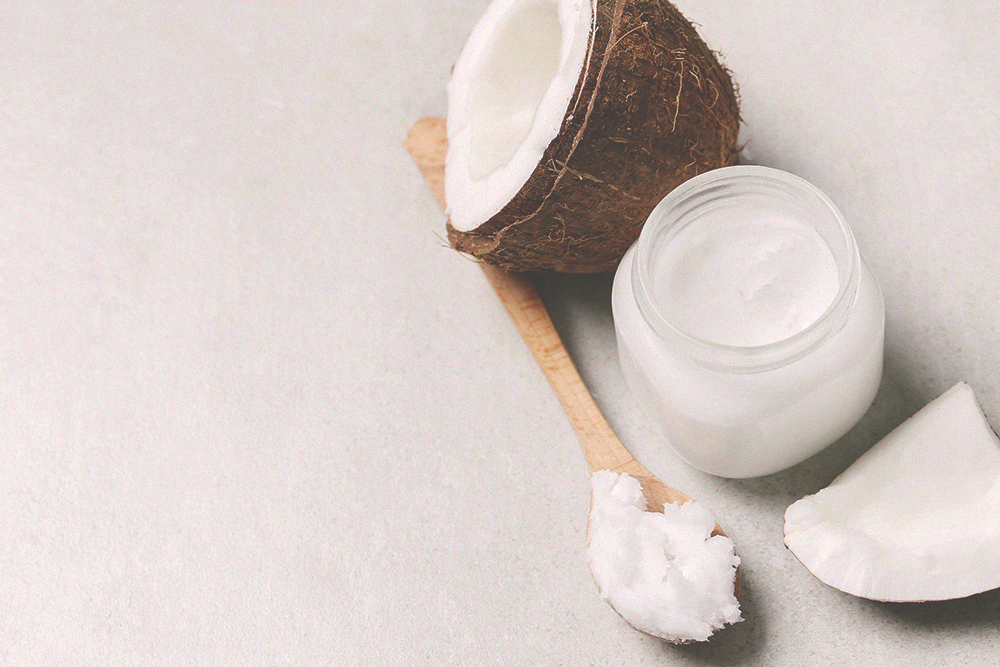Fat is an essential part of our everyday diet, but how much and where its sourced from is what always comes into question. Let’s get the know how this latest “healthy” fat craze of coconut oil began with nutrition Expert Kaleigh McMordie.
Coconut oil has exploded in popularity recently. It’s in everything, with products now tout ing “made with coconut oil!”
Why? Because coconut oil it is perceived as healthy.
Some people even go as far as to eat it by the spoonful. But is coconut oil actually healthy? Or are people just rapidly ingesting globs of fat that will later prove harmful? For questions like this one, let’s turn to science and take a look at what it has to say.
But first a quick nutrition lesson.
All foods are made up of fat, carbohydrates, and protein. Oils and other fats, like butter, are made up of almost 100% fat. Fats (or fatty acids) can have different chemical structures. Fatty acids can be either saturated or unsaturated.
Saturated fats are solid at room temperature and are found in high concentrations in things like coconut oil, butter and other animal products. They are scientifically proven to be unhealthy for your heart when consumed frequently.
Unsaturated fats, on the other hand, are liquid at room temperature, and have been clinically proven heart healthy. They can be found in olive and canola oils, nuts, and fish, among other foods.
Then there are trans fats which are usually made in a lab and are known to be destructive to your cells. They are in anything with ‘hydrogenated oil’ on the label. Furthermore, fatty acids can be short, medium and long, measured by the number of carbons in the fatty acid chains. All of these fatty acids occur in differing ratios in different foods.
So we should probably take a look at the nutritional breakdown of coconut oil:
- Calories: 121
- Saturated fat: 12 g
- % total fat that is saturated fat: 92%
Basically, coconut oil is almost completely saturated fat, and saturated fat intake should be limited, right?
So why does everyone think coconut oil is healthy?
Coconut oil contains a type of saturated fat called medium chain triglycerides (MCTs), which has recently been touted for potential benefits in weight loss.
MCTS are digested differently than long chain triglycerides (LCTs), which is what most fats are. MCTs are capable of being transported straight to the liver, where they can be used as an energy source for your body instead of being stored as fat. LCTs cannot. This has given coconut oil a reputation (thanks in part to a famous TV doctor) for being a miracle weight loss cure.
But for the love of all that is good, please just hold your horses!
While some clinical trials with MCTs have shown their effectiveness in weight loss, these trials studies pure MCT oil. That means 100% of it is composed of MCTs.
Coconut oil has only 40% MCTs. The remaining 60% are LCTs.
Research has yet to conclude that weight loss can be achieved through coconut oil. Also, remember that coconut oil is still fat, and fat still has a high amount of calories, healthy or not. And a overconsumption from any source will lead to weight gain, not weight loss. Sorry.
Another reason coconut oil has received a health halo is because virgin coconut oil contains vitamin E and polyphenols.
These compounds in virgin coconut oil were found to improve good and bad cholesterol levels in a study on rats when compared to refined coconut oil. But guess what else has vitamin E and polyphenols? Virgin olive oil!
And guess which one has been proven heart healthy in multiple clinical trials? That’s right – olive oil. There is still not enough scientific evidence to call coconut oil heart healthy. So far the only thing we know is that it’s high in saturated fat, which is linked to worse heart health.
But let’s not completely hate on coconut oil…it does have it’s place in the kitchen.
Since many recipes call for solid fats like butter or shortening due to their chemical properties, coconut oil is a great choice, especially for vegans. While shortening is also vegan, it’s full of unwanted trans fats. So in the instance that a recipe calls for shortening, coconut oil is a great alternative!
Just make sure to buy extra virgin coconut oil at the store. The refined versions are more processed, and do not have the vitamin E and polyphenol content that the virgin variety does.
Bottom line: there simply is not enough research to deem coconut oil a ‘health food’, although it can certainly be used in moderation.
But please do not eat it with a spoon, people!
Adapted from the original article.
Kaleigh McMordie, MCN, RDN is a Texas-based Registered Dietitian and food enthusiast who shares delicious recipes for those who seek a healthy, vibrant life. By focusing on nourishment without giving up the joy of good food, Kaleigh helps others attain a balanced, wholesome approach to life that brings people together. Learn more about Kaleigh and visit her at Lively Table.

